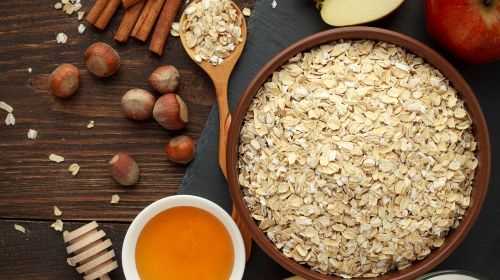There are many reasons for a stomach ulcer: from excessive alcohol consumption to the Helicobacter pylori bacterium and stress. If left untreated, the gastric ulcer attacks deep layers of the stomach and causes symptoms such as pain, heartburn, or nausea. What helps against a stomach ulcer.
The gastric ulcer (Ulcus ventriculi) is one of the most common stomach diseases in Germany. In the beginning, a stomach ulcer often runs without symptoms and therefore goes unnoticed. An inflammation of the stomach lining (gastritis) attacks the mucous membrane and gradually destroys it. This then gives rise to the gastric ulcer.
Article content at a glance:
What are symptoms of a stomach ulcer?
Especially at the beginning, many patients do not feel any discomfort and do not notice the gastric ulcer. A stomach ulcer can show up by the following symptoms:
Patients often cannot tolerate alcohol or fried, spicy foods. These foods stimulate the stomach’s acid production and make the pain worse.
Helicobacter pylori: common cause of gastric ulcer
For a long time, doctors assumed that the causes of a stomach ulcer were too much stress, coffee, smoking and fast food. In the mid-1980s, two scientists discovered the bacterium Helicobacter pylori as a common cause of gastric ulcer.
H. pylori can be detected in the gastrointestinal tract of most people with gastric ulcer. It causes inflammation of the lining of the stomach that progresses without treatment. In addition, the body produces more stomach acid, which encourages the development of the stomach ulcer.
Risk factors for a stomach ulcer:
- alcohol
- Anti-inflammatory pain relievers: Those who take long-term nonsteroidal anti-inflammatory drugs (NSAIDs) such as acetylsalicylic acid, ibuprofen or diclofenac are at increased risk.
- genetic factors
- Smoking (nicotine)
- Psychological stress and stress increase the production of stomach acid
- Operations, accidents or severe burns can result in “stress ulcers”.
Diagnosing peptic ulcer by gastroscopy
First, the doctor asks about the medical history and possible complaints as part of the anamnesis. Lifestyle also plays an important role. The answers will help the doctor assess whether a stomach ulcer may be underlying the symptoms.
If the suspicion is confirmed, a gastroscopy follows. A specialist in internal medicine (internist) or for gastrointestinal diseases (gastroenterologist * gastroenterologist). A gastric ulcer can be detected and its extent made visible by means of gastroscopy. At the same time, a tissue sample (biopsy) can be taken from the gastric mucosa. In this way it can be determined whether the bacterium Helicobacter pylori is the cause. The biopsy also shows whether the lining of the stomach is changed and whether stomach cancer (gastric cancer) is present.
Treatment: what antibiotics for gastric ulcer?
Antibiotics and proton pump inhibitors can be used against the Helicobacter pylori bacterium (eradication therapy). For this, several antibiotics (clarithromycin, metronidazole, levofloxacin, tetracycline and amoxicillin) are usually combined in order to increase the effectiveness of the treatment. Antibiotic therapy usually lasts seven to ten days.
Doctors use a special breath test, the 13C urea breath test, to check whether the antibiotic treatment was successful and all bacteria were killed. For this purpose, urea is taken, the building blocks of which have been specially marked. Later these can be differentiated from normal urea with the help of certain measuring devices. Helicobacter pylori converts urea into the gas carbon dioxide as part of its metabolism. This can be demonstrated in the air we breathe.
Reduce gastric acid production with medication
Newer drugs work directly on the production of gastric acid and reduce it. They are the first choice medicines for stomach ulcers today.
- Proton pump inhibitor (PPI): They reduce the activity of a certain enzyme in the gastric mucosa that is responsible for gastric acid production. Frequently used active ingredients are pantoprazole and omeprazole. Proton pump inhibitors are now also available in low doses without a prescription in pharmacies or online mail order shops. Nevertheless, they should not be used on your own, but only after a doctor’s recommendation.
- H2 antihistamines (H2 receptor blockers): The medication block the docking points of the messenger substance histamine. This is involved in the production and release of stomach acid. Frequently used active ingredients are cimetidine and ranitidine. H2 antihistamines can also be combined with proton pump inhibitors.
Antacids neutralize stomach acid
Medicines that bind and neutralize gastric acid, so-called antacids such as the active ingredient sucralfate, have long been on the market. In gastric ulcer treatment, they have lost their importance due to the newer drugs and are now only rarely used.
Home remedies for stomach ulcer
Stomach pain should not be treated with pain relievers, as it may worsen an existing ulcer. Herbal remedies such as a rolling cure with chamomile tea (drink tea, lie down, let it work, then slowly roll around) are better to relieve stomach pain. Fennel and anise also have a calming and pain-relieving effect on the stomach.
Many ailments can be prevented through lifestyle:
- Pay attention to alcohol consumption, drink only moderately and not every day of the week.
- Drink coffee only in moderation, it irritates the stomach.
- Do not smoke
- Eat stomach-friendly: choose foods that are easy to digest and do not burden the stomach. Better to avoid fatty foods.
- Avoid stress: Those who suffer from stress often try relaxation techniques. Autogenic training, yoga or progressive muscle relaxation according to Jacobson are effective in the fight against stress.
Gastric ulcer: If there are complications, see a doctor quickly
In principle, a gastric ulcer can heal without treatment, but it then takes two to three months. Treatment with acid blockers and antibiotics significantly shortens the healing time. The time it takes to heal depends on the size and depth of the ulcer and lifestyle.
Ulcer complications
Without adequate treatment, the gastric ulcer can cause bleeding. If the bleeding is light, blood can be found in the stool. If the bleeding is profuse, patients vomit stomach contents that look like coffee grounds. The stool can then take on the color of tar. There is a risk of bleeding!
The ulcer often develops at the exit of the stomach (pylorus) at the transition into the intestine. At this point, the mucous membrane can swell and narrow the stomach outlet. Doctors refer to this narrowing as pyloric stenosis. In addition, an untreated ulcer can break through (stomach perforation). Then stomach contents get into the abdomen. If the stomach ruptures, the stomach feels as hard as a board and patients suffer from very severe upper abdominal pain. A ruptured ulcer is always a case for the emergency doctor!
If the ulcer spreads from the stomach to neighboring organs, such as the pancreas, spleen or liver, it can “stick” to these organs. This is also an emergency.
Preventing gastric ulcer – the best tips
If you have a sensitive stomach, it is better to avoid nicotine, alcohol, very spicy foods and certain medications. Anyone who has to take long-term painkillers due to an illness makes sure that they do not attack the gastric mucosa.
Tips for stomach problems:
- It is better to eat several small portions over the day instead of one large meal that is a burden on the stomach.
- Don’t hastily gobble down your food during your lunch break, it’s better to take time to eat and enjoy the meal.
- Bare food is not a must, but everyone affected should try which foods are good for them. High-fat, fried, spicy and flatulent (legumes) foods should only be consumed in moderation.
- Eat lots of fruits and vegetables. It is best to prepare the latter gently, for example by steaming.
- Choose fish more often than meat. If you like to eat meat, it is better to choose low-fat varieties, for example poultry (chicken, turkey).
- Exercise enough, because physical activity gets your digestion going.
- Relax more often in between, because stress is bad for the stomach.
.




